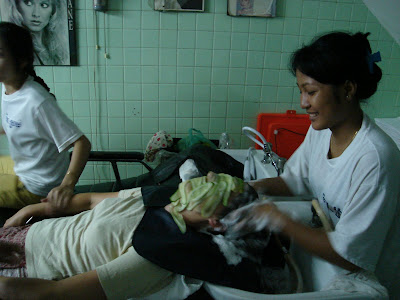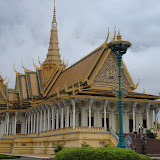“Para el que mira sin ver, la Tierra es tierra no mas”.
.......................................................................
Heute, 1. Februar, sind wir schon seit acht Monaten unterwegs und sind gerade in La Paz in Bolivien auf 3600m angekommen, um in Kuerze weiter zum Titicacasee und anschliessend Peru zu reisen. Da wir vor nicht allzu langer Zeit in Salta, der Hauptstadt des andinischen Folkore in Argentinien, waren, moechten wir ein Sprichwort von Atahualpa Yupanqui zitieren (einer der groessten argentinischen Folkoresaenger, dem Kevin Johansen auf seinem letzten Album das Lied „Atahualpa You Funky“ widmet):
„Fuer den der schaut ohne zu sehen, ist die Erde nur ein Haufen Erde“. (naja, das Wortspiel funktioniert auf Spanisch besser...)
.........................................................................
Today, first of February, it’s already eight months we are on the road and just reached La Paz in Bolivia at 3600 m, from where we will continue shortly to the Titicaca Lake and then Peru. As we passed through Salta not long ago, the Argentinian capital of Andean folklore, we would like to quote a saying of Atahualpa Yupanqui, one of the big Argentinian folk singers. Kevin Johansen also dedicated him a song on his last album called Atahualpa You Funky:
“For who looks without seeing, the Earth is only a lot of earth.” (the second “earth” in the sense of soil... it works better in Spanish)
Tambien, y dado que llevamos en el blog un retraso de varios meses con respecto a nuestra ruta actual, hemos querido hacer un pequeño resumen de nuestro ultimo mes, que ha sido prodigo en encuentros y lugares maravillosos (en el blog ya hemos cerrado Camboya, asi que vendran luego una entrada para Bangkok y otra para Sydney, y luego las relacionadas con Nueva Zelanda, Chile, Argentina, Paraguay... uff!) / Nachdem wir mit dem Blog ein paar Monate hinterher haengen, wollen wir kurz unseren letzten Monat zusammenfassen, der voll von wunderbaren Begegnungen und Plaetzen war / As we have several months delay with our blog, we would like to resume in short our last month, that has been full of being together with marvellous people and discovering incredible places.
En los dias de Navidad visitamos a nuestra amiga Cristina en San Juan (Argentina), para celebrar con ella esa fiesta y su cumpleaños el dia anterior. En la imagen esta ella junto a Silke, y aparecen tambien Luciano y Maria Elisa, viejos conocidos de Barcelona que volvieron a Argentina hace varios años / Nachdem wir in Chile von Santiago gen Sueden und in Argentinien vom Sueden wieder gen Norden gereist sind, verbrachten wir Weihnachten mit unserer Freundin Cristina in San Juan (Argentinien) und feierten auch ihren Geburtstag. Cristina steht hier im Bild neben mir. Zur Rechten tauchen auch alte Bekannte aus Barcelona auf, Luciano und Maria Elisa, die seit mehreren Jahren wieder zurueck in San Juan sind. / After travelling in Chile from Santiago towards the South and in Argentina from the absolute South to the North, we reached San Juan in Argentina around Christmas, where we visited our friend Cristina. We moreover celebrated as well her birthday, to be seen in the picture. Cristina stands next to me and on the other side, Luciano and MariaElisa, old friends from Barcelona, who returned as well many years ago.
Luego visitamos en Cordoba (Argentina) a nuestra amiga Isabelle, y celebramos con ella tambien su cumpleaños (el 30 de diciembre) y la nochevieja. En la imagen las dos estan rodeadas por una bufanda que le llego a la Isa desde Camboya... / Danach besuchten wir unsere Freundin Isabelle in Cordoba (Argentinien), und feierten ebenfalls ihren Geburtstag und anschliessend Sylvester. / Afterwards we visited our friend Isabelle in Cordoba in Argentina and celebrated as well her birthday and a day later New Years Eve.
En Buenos Aires nos encontramos con Gaby (a la izquierda) y Mariana, compañeras de un curso de posgrado que hice en Barcelona hace algunos años. Gaby es porteña y alli vive actualmente, y Mariana es mexicana y vive en el DF, pero estaba de vacaciones en Buenos Aires porque su compañero es de alli. Fue un reencuentro especial porque no las veia desde cuando hicimos el curso! / In Buenos Aires trafen wir u.a. Gaby (links) und Mariana, die mit Ricardo zusammen vor ein paar Jahren in Barcelona einen Postgraduate Kurs machten und die er seitdem nicht wieder getroffen hatte. Gaby lebt in Buenos Aires und Mariana in Mexico DF, war aber gerade in Buenos Aires im Urlaub, da ihr Partner dorther stammt. / In Buenos Aires we met Gaby (left) and Mariana, who did a post graduate course with Ricardo a few years ago in Barcelona and he hadn’t seen them since then. Gaby lives in Buenos Aires and Mariana in Mexico DF, but was just in Buenos Aires on holiday, because her partner is from there.
Tambien en Buenos Aires nos reencontramos con Juan y Maria, amigos de varios años en Barcelona (a Juan lo conozco desde la universidad en Bogota). Una feliz coincidencia hizo que nosotros llegaramos a Buenos Aires justo el dia en que ellos llegaban para instalarse en la capital federal despues de dejar atras su vida en España / Ausserdem trafen wir in Buenos Aires Juan und Maria wieder, gute Freunde aus Barcelona. Ein gluecklicher Zufall wollte es, dass sie am gleichen Tag in Buenos Aires ankamen, um dort zu leben, wie wir. / Moreover we met in Buenos Aires Juan and Maria again, good friends from Barcelona. A lucky coincidence resulted in that they arrived the same day in Buenos Aires to live there than us.
Despues de darle vueltas al asunto, decidimos ir a las cataratas de Iguazu, y vaya si valio la pena! Es un espectaculo unico, maravilloso! En la imagen se ven apenas un par de los mas de veinte saltos que conforman ese portento de la naturaleza / Nachdem wir hin und her ueberlegten, entschieden wir uns doch zu den Wasserfaellen von Iguazu zu reisen, was sich auch absolut gelohnt hatte! Im Bild sieht man nur ein paar der ueber zwanzig Wasserfaelle, die ein unglaubliches Naturschauspiel darstellen. / After thinking it over and over, we finally decided to travel to the Iguazu falls and were so happy in the end we did! The waterfalls in the image are just some of the more than 20 in the area and all form an amazing natural spectacle.
Para ir de las cataratas hacia el noroeste argentino, atravesamos por Paraguay y saludamos a Olga y Roland en Colonia Independencia, justo a mitad de camino entre Ciudad del Este y Asuncion, y donde pasamos unos pocos dias de fantastico descanso. Olga es una vieja amiga de la mama de Silke, y ellos llegaron a Paraguay hace unos seis años a buscarse la vida / Auf dem Weg von Iguazu zum Nordwesten Argentiniens reisten wir durch Paraguay und verbrachten ein paar wunderbar erholsame Tage bei Olga und Roland in Colonia Independencia, einer deutschen Kolonie. Olga ist eine gute Freundin meiner Mutter, die ich damit auch endlich kennenlernte. / On the way from Iguazu to the Northwest of Argentina we travelled through Paraguay to pass a few wonderful and relaxing days with Olga, a good friend of my mother, and Roland in Colonia Independencia, a German colony.
Nos reencontramos con Isabelle y su compañero Ricardo en Tucuman, para viajar juntos por el noroeste argentino hasta la frontera boliviana. Fueron dias de paisajes alucinantes y pequeños pueblos con mucho encanto, y hacer la ruta con ellos fue un placer! / In Tucuman trafen wir wieder Isabelle und ihren Partner Ricardo, um mit Ihnen von dort aus durch den Nordwesten Argentiniens bis zur bolivianischen Grenze zu reisen. In den Tagen sahen wir unglaubliche Landschaften, schoene Doerfer mit Ambiente und hatten eine tolle Zeit. / In Tucuman we met again Isabelle and her partner Ricardo, to travel together with them through the Northwest of Argentina up to the Bolivian frontier. We saw incredible landscapes, beautiful villages with a special atmosphere and had a great time.
Entramos en Bolivia e hicimos un viaje por el Salar de Uyuni y las lagunas altiplanicas, tres dias de aislamiento y de paisajes magicos, una excursion que todavia tiene mucho de aventura a mas de 3500 m de altura. En la imagen, una vista del salar, inundado por las fuertes lluvias del verano altiplanico / Dann reisten wir nach Bolivien und begannen dort eine dreitaegige Tour durch den Salzsee von Uyuni und an Gebirgslagunen in allen moeglichen Farben vorbei. Magische Landschaften auf ueber 3500 Meter Hoehe. Die bolivianische Regenszeit machte den Ausflug etwas abenteuerlich und sorgte dafuer dass der Salzsee um diese Zeit Wasser traegt. / Then we travelled to Bolivia and started there the three day tour through the salt flats of Uyuni and lagoons in all colours, all at more than 3500 metres altitude. As it is rainy season in Bolivia right now the saltflats were full ofwater and it made the excursion a bit more adventurous.

Escogimos terminar la excursion en San Pedro de Atacama, un pueblito encantador en el norte chileno, cerca de la frontera con Bolivia. Alli habiamos quedado de encontrarnos con Maria Jose y Domingo, amigos de Barcelona que pasaban sus vacaciones en Chile por estos dias (ella es chilena). Celebramos juntos el cumpleaños de Silke el 26 de enero, dia en que llegamos a San Pedro / Die Tour beendeten wir in San Pedro de Atacama, ein gemuetliches schoenes Doerfchen im Norden Chiles, nahe der bolivianischen Grenze, denn dort trafen wir uns mit Maria Jose und Domingo, gute Freunde aus Barcelona, die gerade in Chile Urlaub machten (Maria Jose ist Chilenin). In San Pedro kamen wir an meinem Geburtstag an und feierten ihn zusammen mit den beiden. Schoener haette es nicht sein koennen. / We finished the tour of Uyuni in San Pedro de Atacama, a cozy nice village in the North of Chile, near the border to Bolivia, because there we met with Maria Jose and Domingo, very good friends of Barcelona, who just spend their holidays in Chile (Maria Jose is from Chile). We arrived there on my birthday and celebrated it together with the two, just perfect!






























